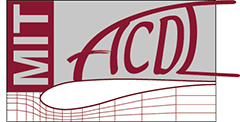Abstract: The expense and difficulty of experiments and flight testing at high speeds makes computational modeling crucial for the design and analysis of high-speed aircraft and reentry vehicles. The extreme aerodynamic and thermal environment encountered by these vehicles also make computational modeling challenging and computationally expensive. Additionally, multiple sources of uncertainty arising from chemical reactions in the flow and thermal protection system need to be accounted for, but doing so requires many computational model evaluations, which is prohibitively expensive for the high-fidelity models required to capture key aerothermal phenomena. This leads to overly conservative designs and/or a very slow design or analysis process.
The high computational cost of computational aerothermal modeling motivates the creation of low-cost surrogate models to enable uncertainty propagation, design optimization, model calibration, and other many-query analyses. One potential means to ease the computational burden of many-query analyses is the use of projection-based reduced order models (ROMs). ROMs are desirable because they incorporate the physics of the high-fidelity simulation by projecting the governing equations onto a low-dimensional manifold derived from a set of computational fluids or thermal solutions. Furthermore, ROMs have been successfully applied to a range of continuum mechanics applications.
This talk presents some lessons learned from the implementation and testing of parametrized ROMs for high-speed flows and thermal protection systems. Results and insights collected from ongoing and previous work at Sandia will be discussed, with a focus on the development of a ROM capability using in-house computational fluid dynamics and computational multi-physics solvers in combination with the open-source Pressio model reduction library. Applications to be discussed include RANS computations and thermal responses for several canonical high-speed flows and flight vehicle geometries.
SNL is managed and operated by NTESS under DOE NNSA contract DE-NA0003525.
SAND2023-00170O
Bio: Patrick Blonigan is a senior member of the technical staff at Sandia National Laboratories. He currently leads or contributes to several research projects on model order reduction and sensitivity analysis with application to computational models of high-speed aerodynamics and thermal protection systems. Prior to joining Sandia in 2018, Patrick was a postdoctoral fellow in the advanced supercomputing division at NASA Ames Research Center. Patrick holds a B.S. in mechanical engineering from Cornell University, a M.S. in aeronautics and astronautics from MIT, and a PhD in aerospace computational engineering from MIT.

